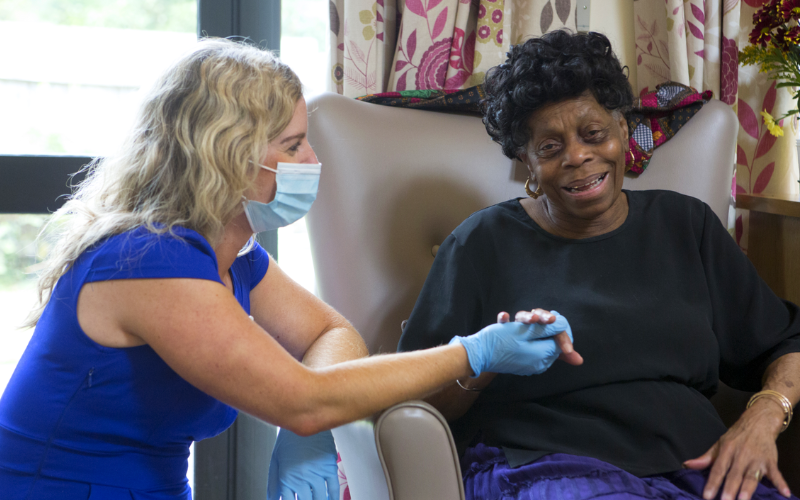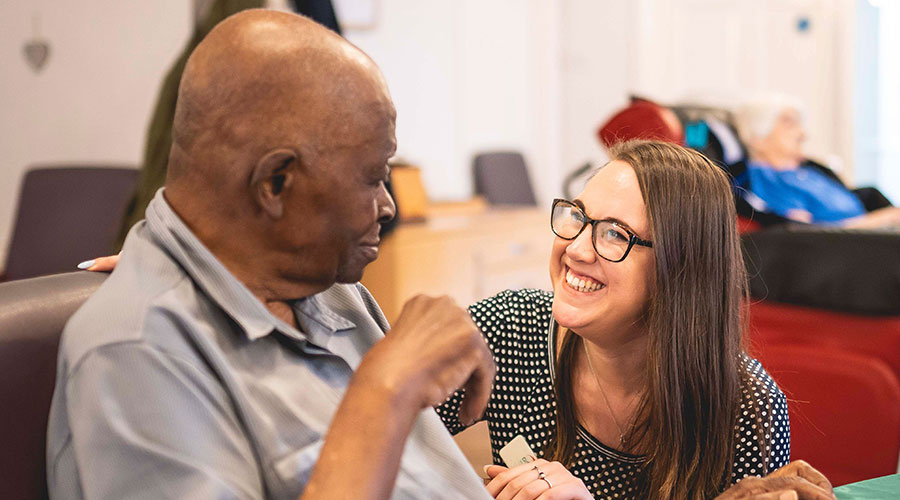How do I know when my loved one is ready for a care home?

We recognise that moving a loved one into full-time care is a very emotive decision. It’s normal to feel overwhelmed, guilty, confused or unsure.
When considering care, it's important to understand what is in the best interests of the individual and their family and friends. If you feel you can no longer provide the care and support they need to live the best quality of life possible, independently and safely, then a care home could be the best choice.
Transitioning into a care home might give you the peace of mind you need, knowing that your loved one has 24/7 access to the care they need both now and in the future.
It might be helpful to ask yourself the following questions about your loved one:
- Are they having more falls?
You could choose to install safety equipment in their home to make daily life as easy as possible. It would be sensible to weigh up the costs of home improvements, what in-home care would cost and also care home fees.
It might be that they need someone to visit for a few hours a day to help around the house and with medication. - Are they losing weight?
Weight loss is a common sign in older people that could indicate they’re struggling to cope on their own. Dementia can also cause changes to your loved one’s health - it may be that they are forgetting to eat or they have forgotten how to cook certain meals. Keep an eye on their weight and try to strike up conversation about what they’ve eaten that day. - If they are living with dementia, is it getting worse?
If your loved one is living with dementia you may begin to notice that they’re becoming increasingly forgetful. They may also struggle to perform basic tasks like dressing themselves, washing, and eating. At first, this behaviour may be manageable in the home, but they could become a danger to themselves so it’s crucial to review what care options are available. - Do they seem down or depressed?
If your loved one lives alone, it can be easy to fall into feelings of low mood. In a care home, there are plenty of activities available to get involved with, and there are always people around to keep them entertained and support them. If your loved one stays at home, MHA offers befriending services too which is a great option to develop friendships and help reduce feelings of loneliness. - Are they neglecting their personal care?
If you notice a change in your loved one’s appearance or body odour, it maybe another sign that they aren’t able to take care of themselves. This is another thing to monitor, you could have at-home care that can help. Or if a care home is an option, there are in-house laundry services included in the fees. - Is their house is unclean and untidy?
If your loved one was particularly house proud and you notice that the house is increasingly becoming unclean, they may lack the physical capacity to tidy up after themselves. Spills that haven’t been cleaned up are also a common sign of dementia as the person is unable to recognise that they should clean it up. - Do they seem confused?
While this can be a sign of dementia, it’s common in old age. If your loved one is struggling to make decisions, follow directions, and need lots of prompts and reminders they may lack the capacity to live independently. - Are they needing help with their finances?
It’s important to check that your loved one is coping with their finances. Look out for unpaid bills and post, these could indicate that they need extra help with homeowner responsibilities. If you need any help with this, we have information pages about managing household finances >
Unexpected events
In some circumstances, an unexpected event or illness means that a quick decision about care is needed, including:
- A hospital admission
- Their carer becomes ill and is unable to care for the person
- Increasing safety concerns.
People who can support you
Talk things through with friends or family members and seek help from health and social care professionals to give their view on what is needed.
You may also be able to get a Care Assessment of a person’s needs from your local authority (or in Northern Ireland, your health and social care trust). The assessment will decipher your loved one’s care needs, which should help you make a decision. Contact your local authority for help. We have more information on assessments and paying for care home fees.
Further support available
- Carehome.co.uk have guidance on how to cope with the guilt of moving your family member into a care home
- Take a look at our advice on choosing the right care home
- Understand the different types of care available
- Home care services to help you stay in your own home
- Funding to adapt your home for accessibility
- If you’re looking into any care home options, make sure you check the Care Quality Commission (CQC) ratings >
Page last updated: July 2023.
MHA in your community
Find the care home, retirement community, or support group that’s right for you

